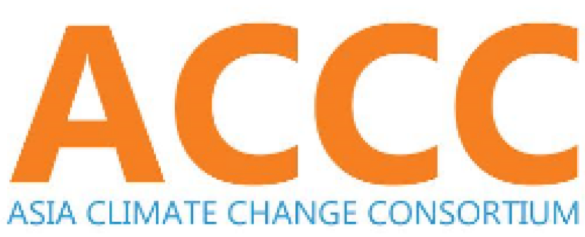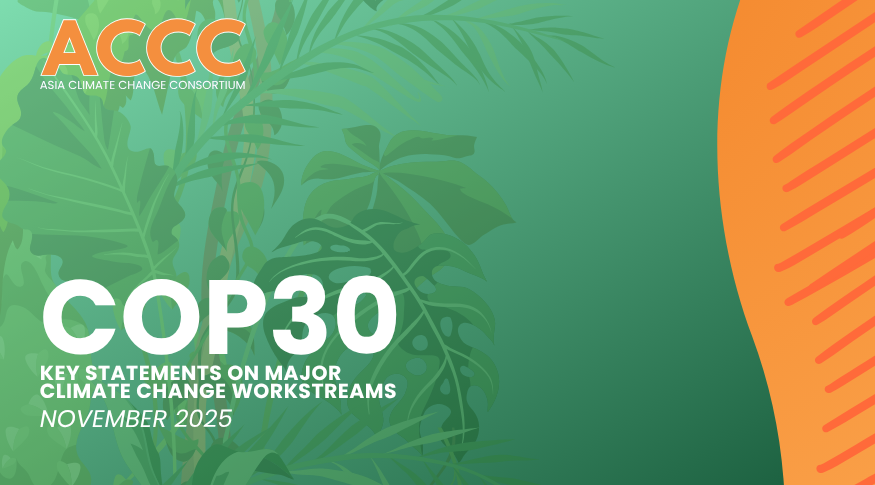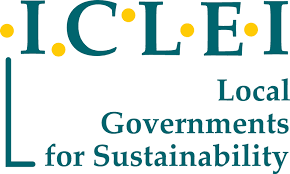This November 2025, the largest United Nations global event for discussions and negotiations on climate change, the Conference of the Parties (COP), will be held. Annually, international leaders and civil society convene to discuss how we can collectively address the impacts of climate change. Just as we have every year for over a decade, we approach the upcoming COP30 with high hopes for more ambitious commitments and concrete actions from governments and corporations worldwide.The worsening climate crisis demands an urgency and scale of response that have been far from actualization. Thus, Asia Climate Change Consortium (ACCC) calls for more Transformative and Systemic Change to address Climate Change.
This year,ACCC decided to focus its calls on three themes: (1) Agriculture and Food Systems, (2) Ocean and its Community and Ecosystem, and (3) Gender Justice and Inclusive Governance. All calls on the major climate change workstreams such as Adaptation, Mitigation, Loss and Damage, Climate Finance, and Technology Transfer will be integrated to all three themes.

ACCC highlights in this paper the messages from the communities that ACCC members are directly helping: vulnerable communities in Asia who suffered greatly due to climate change impacts and were put in a life situation they never wanted in the first place. Together with the communities, we also call for the protection, rehabilitation, and conservation of key ecosystems — both aquatic and terrestrial — which are essential to sustaining life.
We anticipate and indeed demand a fundamental shift from rhetoric to tangible implementation, where pledges translate into policies and investments that genuinely address the worsening state of our climate. This includes not only commitments to reduce greenhouse gas emissions but also robust strategies for adaptation, climate finance, and addressing loss and damage, particularly for the most vulnerable nations.
ADAPTATION
- Empowering and building resilient communities requires prioritizing sustainable agricultural practice through enhancing access to scientific and local climate information, including downscaled weather forecasts and robust early warning systems, and significant investment in capacity building for vulnerable farming communities, improving water availability and irrigation, and increasing research into and accessibility of heat- and drought-tolerant crop varieties to reduce losses and damages.
- Restoring ecosystems is crucial for enhancing community resilience and adaptive capacity, particularly through the promotion of climate-resilient, sustainable agriculture and strategic agroforestry practices to ensure food security.
- Implement policy and legal reforms that directly support community adaptation actions and strengthen institutional capacity within the food system, concurrently undertaking systemic change in the farming input value chain away from corporate dominance, promoting harmful chemicals and hybrid seeds, while also designing farmer-benefiting subsidy programs that protect natural resources and mandating comprehensive studies and community consultations before any large-scale infrastructure development.
- Community-managed and Science-based ecosystem restoration with livelihood, instead of further inappropriate land reclamation (for coastal areas) and land conversion (for forest and mountainous areas) projects solely for commercial purposes.
- People and ecosystems-based multi-scenario scientific probabilistic risk analysis for infrastructure development, along with the development of relocation/resettlement plans for communities threatened by climate-induced hazards.
- Gender-responsive and transformative adaptation policies and financial supports that strengthen women’s leadership in climate action.
- Recognize women-led adaptation initiatives and scale them up by providing direct access to resources tailored to their respective local contexts.
- Establish functional National Gender and Climate Action Plans, supported by a robust framework to monitor gender-disaggregated approaches. Such an accountable system and intersectional approach will ensure equitable benefits for all.
- Bolder Targets with More Urgent Mechanisms for Global Goal on Adaptation (GGA). More communities had difficulties already in adapting to the worsening climate conditions. We must have bolder commitments and targets to address adaptation globally.
MITIGATION
- Prioritize Nature-Based Solutions and Ecosystem Protection: Regenerate nature and protect ecosystems as fundamental to a sustainable future. This includes supporting regenerative mangroves to prevent soil erosion, filter water, and restore thriving ecosystems, emphasizing the critical role of nature-based solutions.
- Transition to Low-Emission, Resilient Agricultural Practices: Promote a shift towards less-emission/low-carbon agricultural practices, including agro-ecology, agroforestry, and climate-smart agriculture. Encourage the adoption of innovative irrigation systems to cut agrarian emissions and boost climate resilience, ensuring a just energy transition within the agriculture sector.
- Ensure Equitable and Consultative Land Use: Stop unjust purchases or land-grabbing of farmland for renewable energy facilities, and ensure all such developments are preceded by thorough consultation to protect community land rights and welfare.
- Protecting and restoring coastal and marine ecosystems must be prioritized to sustain and enhance their natural capacity to sequester carbon, thereby contributing significantly to climate mitigation while supporting biodiversity and community resilience.
- Integrated ocean planning and policy frameworks should mainstream ocean-based mitigation actions, ensuring alignment with the Sustainable Development Goals and just transitions for ocean-dependent communities. Improve coastal waste management and sustainable ecotourism.
- Enhanced Participation in Just Transition Initiatives: Promote women’s involvement in planning, decision-making, and access to resources across all affected sectors and at all levels —local and national —within climate action and transition processes.
- Leadership in Climate and Renewable Energy: Advocate for women’s leadership in climate negotiations and the renewable energy industry to ensure that sustainable mitigation technologies are accessible to local communities. This initiative, “Women Leading Green Solutions,” aims to empower women in driving climate solutions.
- Recognize the Foundational Role of Women’s Expertise: Emphasize that women’s wisdom and experience should serve as the fundamental basis for decisions on all project interventions, including those related to climate, development, and renewable energy investments.
LOSS AND DAMAGE
- Prioritize Agriculture and Fisheries in Loss and Damage Funding: The agriculture sector, including inland fisheries, must be a priority for the Loss and Damage Fund. We need to increase funding and put in place operational mechanisms, and ensure that more communities from the agri-fisheries sector are consulted in developing the fund’s framework. This includes securing practical financial solutions to address agricultural damages and the loss of native species driven by climate change.
- Ensure Justice and Reparations for Agricultural Loss and Damage: It’s essential to establish laws and policies that guarantee reparations for damages incurred by the agricultural sector. This also involves improving readiness (fund and mechanisms) and access to information on loss and damage, as well as providing government-paid crop and livestock insurance to protect livelihoods and preserve ecosystems, ultimately investing in resilience.
- Fund Biodiversity and Evidence-Based Solutions: Establishing evidence-based solutions for loss and damage is crucial to effectively linking them to and influencing necessary climate-related policy and regulatory shifts.
- Climate policies and finance mechanisms must prioritize accessible, adequate, and timely funding specifically targeted at ocean and coastal loss and damage, including compensation, relocation support, and cultural preservation.
- Transformative adaptation strategies, including managed retreat and livelihood shifts, should be implemented with proactive community engagement to safeguard rights, well-being, and dignity.
- Actively amplify women’s voice for climate and gender justice to hold the governments accountable in implementing policies and programmes on loss and damage.
- Inclusive Governance to ensure the management of Loss & Damage fund and programs effectively address both economic and non-economic losses and damages.
- Integrate protection and health services into climate responses—because resilience means safety, dignity, and well-being for all. Climate change amplifies risks of gender-based violence, child marriage, and worsens reproductive and mental health for vulnerable groups.
CLIMATE FINANCE
- Streamline and Prioritize Community-Led Climate Finance: Simplify funding conditions and shorten application processes for agricultural and climate action funds, ensuring direct community access that bypasses intermediaries. We urge the establishment of special funding packages for community-based climate action, advocating for grants over loan-based funding to avoid new community obligations. Instead, implement context-appropriate management models that ensure accountability without creating debt.
- Enhance Institutional Capacity and Coordination: Strengthen institutional capacity and inter-sectoral coordination across all levels of government, the private sector, and civil society organizations. This collaborative approach is vital for effective climate interventions.
- Increase Accountable Financial Support for Agri-Food Systems: Provide more financial support for agricultural and food systems, while also enabling private sector investment in climate interventions in a fully accountable manner.
- Avoid loan-based funding that creates new community obligations. Instead, implement management models that are context-appropriate for each community, ensuring funds are not free, don’t create debt, and are manageable by the community.
- Promote a sustainable blue justice by strengthening public-private partnerships that protect marine resources while creating jobs and innovation.
- Direct, flexible, and accessible grant-based climate finance to grassroots women, women-led communities including indigenous people, youth and other vulnerable groups.
TECHNOLOGY TRANSFER
- Prioritize Pro-Poor, Inclusive, and Locally-Owned Innovation: Promote pro-poor, user-friendly innovation and technology in agriculture, ensuring an inclusive and just energy transition. We must integrate and respect local and Indigenous knowledge and technology with larger-scale innovations, ensuring that farmers own and have accessible control over the technology they use, rather than it being dominated by large corporations (e.g., making drone technology accessible to individual farmers).
- Advocate for Decentralized, Sustainable Agricultural Systems: Actively say “No to the promotion of industrial agriculture.” Instead, call for the decentralization of agricultural technologies and the development of local capacities to understand and access technology.
- Ensure Robust Accountability and Transparency: Establish and uphold accountability in Monitoring, Reporting, and Verification (MRV) processes for all interventions. policy, regulatory, and ethical frameworks must guide technology transfer to promote transparency, accountability, equity, and inclusivity





 c/o Rice Watch Action Network
c/o Rice Watch Action Network